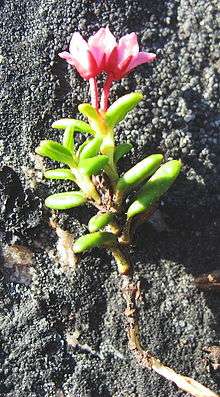Kalmia procumbens
| Kalmia procumbens | |
|---|---|
 | |
| Scientific classification | |
| Kingdom: | Plantae |
| (unranked): | Angiosperms |
| (unranked): | Eudicots |
| (unranked): | Asterids |
| Order: | Ericales |
| Family: | Ericaceae |
| Genus: | Kalmia |
| Species: | K. procumbens |
| Binomial name | |
| Kalmia procumbens | |
| Synonyms | |
|
Azalea procumbens L. | |
Kalmia procumbens, commonly known as alpine azalea[1] or trailing azalea,[2] is a dwarf shrub of high mountain regions of the Northern Hemisphere that usually grows no more than 10 centimeters (4 in) tall. Originally named by Linnaeus as Azalea procumbens, it is also named after French botanist L.L.A. Loiseleur-Deslongchamps - Loiseleuria procumbens.
Distribution
Kalmia procumbens is not well known though it has been widely distributed. These plants are common in the subarctic regions and high mountains of the northern hemisphere and is also found in Eurasia and Maine. It is easy to propagate.
Habitat and Ecology
Kalmia procumbens prefers alpine or subalpine, rocky exposed habitat. They grow above treeline with mountain heathers and at low elevations in bogs.
Morphology

Individuals of this species are shrub grown for two to five rose-pink flowers. Its leaves are opposite and its evergreen leaves are leathery blades to 8mm long and have incised margin. Edges are rolled under green on the top and white with dense short hairs underneath.
Flowers and fruit
Flowers of Kalmia procumbens are bell shaped and five lobed, and have five stamens. The flowering time is late spring and summer however it also depends upon altitude and climate.
References
- ↑ "Loiseleuria procumbens". Natural Resources Conservation Service PLANTS Database. USDA. Retrieved 26 January 2016.
- ↑ "BSBI List 2007". Botanical Society of Britain and Ireland. Archived from the original (xls) on 2015-01-25. Retrieved 2014-10-17.
Notes
- Maine Department of Conservation Natural Areas Program: Loiseleuria procumbens (Alpine Azalea) (2004)
- Wiley, L. 1969. Rare wild flowers of North America. pp 308–313.